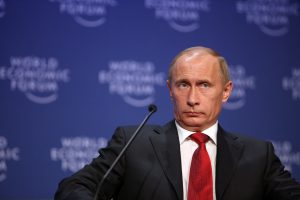We cannot rule out the possibility that the US president will once again give the Ukrainians the military means to impose a compromise that is not a surrender. But his reasons for wanting to reach an agreement with Putin run extremely deep.
A face-to-face meeting with Zelensky, an angry message to Putin: what are we to make of Trump’s latest move on Ukraine? First hypothesis: the Holy Spirit. The majesty of the setting and the collective emotion that gripped world leaders and ordinary Christians alike may have made Donald Trump realise that it was not impossible, after all, that his friend Putin was ‘tapping him along’ and ‘maybe he does not want to stop the war’.
More credible is the other hypothesis, which is that Donald Trump has decided to put pressure on the Russian president by brandishing the threat of new sanctions. This would come as no surprise, as Vladimir Putin is in no hurry to accept the American peace proposals, even though they offer him everything he wished for. The United States would recognise not only that Crimea is controlled by Russia, but that it belongs to Russia. The front line would become a demarcation line between two Ukraines, and the doors of the Atlantic Alliance would remain closed to an independent Ukraine.
Dismembered, Ukraine would be at the mercy of further Russian aggression, but this is not enough for the Kremlin leader, who also wants it to be demilitarised and stripped of the weapons and men necessary for its defence. That is a lot to ask, but can we then yet hope that Donald Trump will go so far as to engage in a trial of strength with Vladimir Putin by giving the Ukrainians back the military means to impose a compromise that is not a surrender?
Blackmailed into respecting its values ?
This man is capable of such U-turns that we cannot rule this out, but his reasons for wanting to reach an agreement with Vladimir Putin run extremely deep.
The first is that to him, the Kremlin’s claims on Ukraine seem to be entirely legitimate. Like Vladimir Putin, he sees Ukraine as nothing more than a province of the Russian Empire, lost during the collapse of the Soviet Union but destined to return to it. This is what Donald Trump expresses when he insists that it was Volodymyr Zelensky who started this war because, he seems to be saying, by seeking to perpetuate his country’s independence, he condemned Vladimir Putin to start it.
In his mind, Ukraine has counted on US military support to defy the inevitability of a return to Russian suzerainty. Ukraine, he believes, has blackmailed America into respecting its values, and Joe Biden was wrong to give in. That is why he considers himself well placed to try to work for peace now that the damage has been done, and why he is threatening to lose interest in the crisis if he fails to bring the Ukrainians to heel.
Donald Trump seems to be unaware that many Davids have defeated many Goliaths in history. It does not occur to him that the aspiration for national independence has defeated more than one empire, but why does he forget the anti-colonialism of the United States, the system of international law it promoted after the world war, and its alliance with Europe?
The answer is obvious: this president wants to break with everything that has made up the political identity and authority of the United States on the international stage, but which now limits its freedom of manoeuvre.
This is no whim
He is turning his back on anti-colonialism because there are no longer any French or British empires against which to assert America’s power, only borders to expand, in the north and in the Arctic. He rejects international law because he wants to be able to conquer Greenland and Canada through interference, pressure or force, just as Vladimir Putin has gradually done in Ukraine, also invoking ‘national interest’. As for Europe, he loves it so much that he prefers there to be 27 of them. He wants a fragmented Europe, incapable of defending itself, economically, politically or militarily, because he wants only vassals on this continent, which he is ready to share with Russia.
Donald Trump’s policy on Ukraine is therefore not a whim. On the contrary, it reflects the scale of the shift he wants to bring about in the United States to make it the most powerful of the three empires – Russian, Chinese and American – that will divide this century between them. The problem for him, as we can see from the way Vladimir Putin is ‘toying’ with him in Ukraine, is that the Russians and Chinese would like to see themselves in first place, ahead of the United States.
(Photo: Official White House Photo by Shealah Craighead via Flickr)



